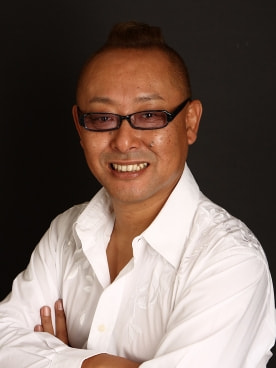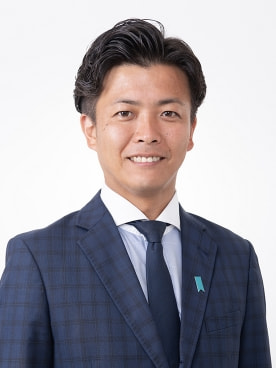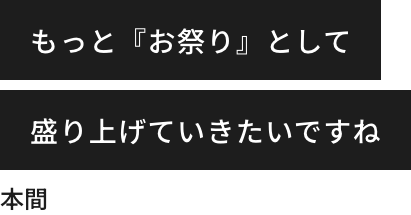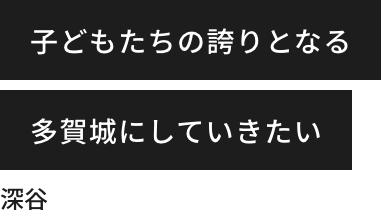
Crosstalk






To convey invaluable historical
value to the future.
In commemorating the 1300th anniversary of the founding of Tagajo, Mayor Koichi Fukaya and Mr. Akihiko Homma engage in a dialogue. Reflecting on the timeless history, they discuss the present and future of Tagajo.
-

TV, radio personality
Akihiko Honma
(Residing in Tagajo City) -

Mayor Tagajo
Kosuke Fukaya



- Fukaya
- I heard that you have been living in Tagajo City for eight years now. How is it comfortable to live?
- Honma
- I really like it here. First of all, the convenience is excellent. There are plenty of commercial facilities, so I never have trouble with everyday shopping. Also, the access to Sendai city center, which is my main workplace, is good. It's nice that even though it's a city, it's quiet at night.
And, since I love fishing, it's important that it's 'close to the fishing boats,' whether I'm going to Shichigahama or Shiogama (laughs).
- Fukaya
- Thank you (laughs). Is there anything else you've felt or realized from living here?
- Honma
- Originally, I've always been interested in history and archaeology, and I even studied it in college. My future plan was to return to my hometown on the Oshika Peninsula and work at the Whale Museum. In fact, I've also obtained qualifications as a curator.
With that background, if I were to sum it up in a few words, 'Tagajo is the best!' The presence of the government office site, the restored South Gate, the remains of Tagajo Temple – just going to places where there's nothing now and realizing 'Ah, there used to be a temple here!' gets me excited. The simple act of imagining those things brings me great fulfillment.(laughs).
- Fukaya
- You are truly a history enthusiast, Aren't you? (laughs).
Similarly, I was taught that reflecting on the past in seemingly mundane moments is also a way to enjoy the history of Tagajo.
However, I was surprised to learn that you hold qualifications as a curator.
- Honma
- I really like it. Even now, I go out casually if I have time, and I enjoy standing there and imagining and taking pictures.
- Fukaya
- That's also interesting. On the other hand, speaking of hometowns, the position of the mayor is not what, and I think Tagajo City is the most livable city in Japan.
It's close to the sea and mountains, it's not too cold and not too hot, and there's little snow in winter. With the 1300th anniversary of its foundation, we would like to appeal more about the ease of living in Tagajo City.
- Honma
- That sounds great! As you can see clearly when you actually live, Tagajo City is "Raku" in all daily life, including movement. I think that's a good place.
Personally, I also like the fact that there are few steep slopes. I basically travel by my own car at work, so I feel comfortable especially in winter without worrying about snowy roads. The mammoth slope is different (laughs).
- Fukaya
- Yes, that slope is different (laughs).



- Fukaya
- At present, Tagajo City is undertaking various initiatives for the 'Tagajo 1300th Anniversary.' What are your thoughts on this 1300-year history?
- Honma
- Well, 1300 years is quite extraordinary. Just the fact that there was a castle called Tagajo here 1300 years ago, where we are living now, is remarkable to think about.
- Fukaya
- Exactly. That's why I want to further energize this project.
- Honma
- While various initiatives are undoubtedly important, I think the key is to encourage everyone to imagine the fact that there was a castle called Tagajo. It could be a significant catalyst. Considering that 1300 years ago, this place was the center of Tohoku.
- Fukaya
- Imagination is crucial, isn't it? Imagining the thoughts of the people who were here 1300 years ago can lead to learning, and it might provide hints for the future of Tagajo.
- Honma
- Even in my household, discussions about Tagajo's history often arise, with questions like 'What was that all about? ' At those times, I take on the role of explaining with my own imagination, saying 'Well, let's see...' (laughs).
As a resident of Tagajo, having at least a basic knowledge seems essential.
- Fukaya
- I'm also continuously learning (laughs). However, the more I know, the more I feel the irreplaceable charm and pride of Tagajo. And standing at the site with historical significance, you might feel the same breeze as 1300 years ago. This value is unique to Tagajo.
- Honma
- Feeling the 'breeze, sounds too cool! But our sentiments are the same. I really hope everyone gets to experience feeling the breeze.



- Fukaya
- There are various ongoing projects related to the 'Tagajo 1300th Anniversary.' Based on your experience, Honma-san, I would appreciate any advice on 'what else could be done.'
- Honma
- I believe it's all about festivals. Personally, I'm a big fan of festivals. I've been involved in launching Sendai's 'Suzume Odori' and even helped organize the local 'Whale Festival' in Oshika, including hosting duties. So when I thought about how to liven up this 1300th anniversary as a Tagajo citizen, 'festivals' were the first thing that came to mind.
And, it's also a wish of mine, but I'd love to see a grand procession reminiscent of the Heian era, with everyone dressed in elaborate costumes, like something out of a picture scroll.
- Fukaya
- Thank you very much. In fact, we are currently considering whether we can arrange costumes based on the dyeing techniques of the time for the aniversary ceremony.
- Honma
- That sounds great! I'd like to involve people of all ages, from the elderly to children, and do various things. It will contribute to making the 1300th anniversary festival truly memorable.
For example, we could organize workshops where children make armor out of cardboard or paint them.
- Fukaya
- Recently, I heard a story about using leatherwork, a local industry in Asakusa, Tokyo, to create leather happi coat (a type of Japanese tradittional coat), where elementary school students drew their own pictures on them, high school dance groups wore them and performed, and then they went abroad to promote Asakusa as the 'town of leather products.'
It was a great success in promoting Japanese culture to the world by connecting the charm of the local area through children.
- Honma
- That's wonderful. When everyone, regardless of age, can participate, it becomes an invaluable experience. When children get involved, even the elderly say, 'Let me help,' and it creates a ripple effect.

- Fukaya
- If children can learn through experiences and receive support from the adults around them, it will open up various possibilities. When there's a movement centered around children, and it's visible, I believe the entire town will come alive.
- Honma
- To create such a flow, I think 'festivals' are crucial.
- Fukaya
- That's right. While there are already several plans in progress regarding festivals, I would like to ask for Honma-san's assistance as well.
- Honma
- As a representative of the festival-loving citizens of Tagajo City, I'll do my best to assist as much as possible (laughs).



- Fukaya
- I once received a question from a local resident: 'What do you consider as the measure of success for the Tagajo 1300th Anniversary Project?' Personally, I'm still not clear about the criteria for success, but one thing I can say is that the 1300th anniversary is not just a goal but a new starting point. I hope it serves as a catalyst for many citizens to think about their city. Perhaps that could be the goal and success.
- Honma
- The beginning of something new sparked by the 1300th anniversary seems very promising. Especially for the children who will shape the future, it will be an unforgettable memory and a source of pride.
- Fukaya
- Pride is indeed essential. I believe the 1300th anniversary is a significant milestone, creating valuable opportunities for generating pride.
- Honma
- Exactly, it will be an experience unique to Tagajo.
- Fukaya
- I remember once when I traveled to Himi City, Toyama Prefecture, and was asked at a restaurant, 'Where are you from?' When I replied, 'I'm from Tagajo,' they said, 'I've seen it in textbooks!' It made me happy.
Although it's a small experience, since the city where one is born and raised is related to one's identity, I want to make sure to pass on that pride to the children who will lead the next generation.
- Honma
- I understand. When asked about my hometown, I also say, 'I'm from Ayukawa in the Oshika Peninsula.' It's essential because it reflects the experiences and growth I've had since childhood, something that remains invaluable no matter how old one gets.
- Fukaya
- You still hold your hometown dear, and your presence on TV and radio exudes warmth and has a significant influence on the community.
- Honma
- TV and radio are actually analog two-way communication worlds, which I find fascinating.
For example, if I say on air, 'The irises at the Ayame-en in Tagajo Castle Site are blooming,' I immediately receive reactions like, 'I saw them too!' or 'I want some gohei-mochi!' Real communication has a strong impact.
- Fukaya
- Exactly. No matter how much tools like social media evolve, I believe deep communication happens through face-to-face interaction. Keeping that in mind, I aim to provide citizens with as much real and interactive information as possible in the future.
- Honma
- I'm good at that (laughs), so feel free to reach out whenever you need to send a message.
- Fukaya
- Really! There's nothing more reliable and joyful than this. Please continue to support us as 'Honma-chan, loved by all.' Thank you very much for your time today.
- Honma
- Thank you as well. Let's definitely organize a festival together!

(Interviewer & Editor/ Takahiro Kamata)
